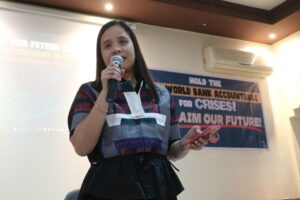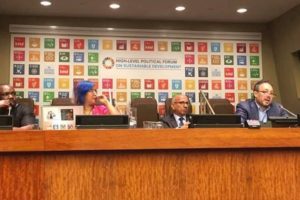June 23-24, 2013, Istanbul, Turkey
Youthful representatives of various Asian CSO fromations joined hundreds of young climate justice advocates from 134 countries at the Global Power Shift Summit in Istanbul from June 24 to 30. The Istanbul climate summit is the first-ever international conference dedicated to building a global youth movement towards solving the climate crisis.
Many of the summit’s attendees are already leaders of youth movements in their home countries. Participants include activists fighting coal plants in India, islanders raising awareness about sea-level rise in the Pacific, Kenyan youths campaigning for sustainable development across Africa, and student activists leading a new, fossil fuel divestment movement in the United States.
Among the diverse array of participants are the Asian youth leaders who represented various organizations committed to combatting the global climate crisis.
- Feby Basco-Lunag, representing the Cordillera Youth Network for Global Change
- Philline Marie Donggay, a Climate Leader with the Climate Reality Project
- Leon Dulce, campaign coordinator of the Kalikasan People’s Network for the Environment
- John Lumapay, Artist and Teacher
- Marjorie Pamintuan of the Asia-Pacific Research Network
- Erin Sinogba, representing Redraw The Line, a climate change campaign led by the Asia-Pacific Media Alliance for Social Awareness
Participants of the said event aim to represent the concerns of millions of people around the world who are already feeling the impacts of climate change, from worsening droughts, devastating storms to the persistent sea-level rise that threatens many island nations and coastal communities.
“Young people from around the world came to Global Power Shift to build a movement that can create the political will necessary to solve the climate crisis,” said May Boeve, the Executive Director of 350.org, an international climate campaign that helped convene the summit.
On Saturday, June 29th, Global Power Shift participants joined a march in Istanbul with thousands of Turkish citizens and Greenpeace campaigners to protest against coal-fired power plants. Coal-fired power plants are the biggest source of manmade carbon dioxide emissions that are already causing severe weather patterns and ruining people’s health.
Greenpeace International Executive Director states that the youth delegates of the climate summit will serve as the next wave in the global movement to stop cases of coal burning and in the future campaigns for climate change.
Secretary General of the Asia Pacific Research Network (APRN), Marjorie Pamintuan further stressed the need to tackle climate concerns especially in the Asia Pacific where seven out of ten countries most vulnerable to climate change impacts can be found.
“Asia Pacific is also home to the world’s most poor and climate-sensitive livelihoods such as agriculture and fisheries. Along with lives and livelihoods, cultures and social identities also face the risk of being lost as communities confront the threat of migration due to the destruction of their habitats. The Global Power Shift provided a venue to build the capacities of climate campaigners to build and strengthen the movements in their countries to address the impacts of climate change, step up the fight against fossil fuels, and demand climate justice for the poor and vulnerable populations,” she added.
Leon Dulce of the Kalikasan People’s Network for the Environment commended the GPS for providing the opportunity to unite East Asia constituents towards resolving four major areas of climate change that include 1) coal divestment and renewable energy, 2) extractive industries (i.e. mining, agri-industrial plantations, 3) foreign investment in dirty industries, and 4) large dams (i.e. the Mekong river). Dulce also expressed optimism in seeing a “qualitative leap” in the Asia-wide campaign for climate change in the years to come.
The workshops at the GPS trained participants in the fields of campaign strategy, online organizing, communications, and public mobilization. The workshops were led by seasoned activists behind some of the past decade’s most successful environmental and social justice campaigns. Participants also shared their own lessons and skills in self-organized sessions and regular meetings with activists from their region.
“Global Power Shift was an excellent opportunity to meet and share stories with hundreds of like-minded climate leaders from all over the world, as well learn some new, valuable skills. I enjoyed and felt energized by the great work being done all over the world. I look forward to starting our work helping those most affected by the climate crisis in the Philippines,” said Erin Sinogba of the Redraw The Line Campaign.
The Global Power Shift Summit was convened by 350.org, an international climate campaign that has organized over 20,000 climate demonstrations worldwide together with a coalition of partners including Friends of the Earth International, Greenpeace International, the Global Campaign to Demand Climate Justice, and numerous youth climate groups among other climate advocates. The conference was hosted at Istanbul Technical University that generously provided space for the GPS events. GPS was inspired by a series of national Power Shift summits that have taken place over the last five years in the United States, Europe, and Australia. After this week’s summit in Istanbul, participants will head home to organize their own national Power Shift summits, mobilizations, and campaigns around the world. Plans are already underway for a 10,000-person U.S. Power Shift in Pittsburgh this October hosted by the Energy Action Coalition.#
The Global Power Shift Summit was organized by the international climate campaign 350.org, with support from partner organisations Avaaz, Greenpeace, Friends of the Earth, the Global Campaign to Demand Climate Justice, and others. 350.org is named after 350 parts per million, what many scientists consider is the safe upper limit of carbon dioxide in the atmosphere. For more information about Global Power Shift, visit http://www.globalpowershift.org. For more information about 350.org, visit http://www.350.org.



